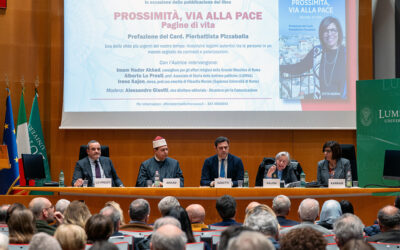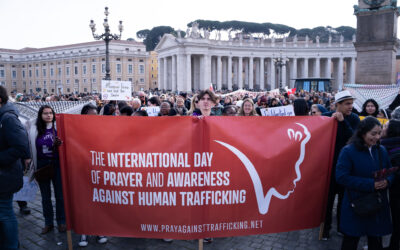 Video in Italian (2 minutes, 30 seconds) « The proposal of dialogue goes far beyond simple tolerance, which can also be considered an achievement and is always a value at risk in our society. If two centuries ago Lord Stanhope could say that tolerance, which was once invoked as a grace and then acquired as a right, “would be rejected one day as an insult,” it was because he foresaw that one day – we hope today – people would become sensitive to higher values, like dialogue, that is, not only tolerating the other person, but profoundly respecting him or her, being open to different ideas, building a relationship among true brothers and sisters. What do you think of this reflection? » Piero Taiti asks Chiara. I’m sure that dialogue goes far beyond tolerance, even though I wouldn’t totally disregard tolerance because it would be a first step in some cases, at least people wouldn’t be fighting one another. Dialogue, however, is a completely different thing, it’s mutual enrichment, it’s loving one another, it’s feeling that we are already brothers and sisters, it’s creating universal brotherhood on earth, so it’s completely different. Of course, dialogue is true if it is animated by true love. Now, love is true if it is not selfish; otherwise, it’s not love. What kind of love would it be? It would be egoism. In fact, you’ve asked me a number of questions in which you speak of a love that might nurture personal interests, even in dialogue. Such a dialogue would not be built on love, so it wouldn’t even be dialogue, it would be something else. Proselytism. Proselytism must stay outside of this door, it can’t be admitted, otherwise, there isn’t dialogue. Dialogue means loving, giving what we have within out of love for the other, and also receiving and enriching ourselves. This is dialogue: becoming “world men and women,” as our gen say, people who are open to everyone and who give what they have to everyone. I remember that when we first began to live this way of life, we followed the path of loving, and we were really convinced that love is not selfish. You must not love in order to win over another person, or to form a little group for yourself. You must not love in order to have an impact, let’s say, in the office or at school. No, you must love simply in order to love. Our motives were supernatural because of our Christian convictions. Here, we can speak of building a brotherhood, this value of universal brotherhood, but never in order to conquer others. And this is why very many people followed us – because they felt free and they saw the beauty of this way of life. Likewise, we’ll have many contacts with people of other convictions, if we love in this way. Chiara Lubich at the Meeting with Friends of Other Convictions Castel Gandolfo, February 8, 1998
Video in Italian (2 minutes, 30 seconds) « The proposal of dialogue goes far beyond simple tolerance, which can also be considered an achievement and is always a value at risk in our society. If two centuries ago Lord Stanhope could say that tolerance, which was once invoked as a grace and then acquired as a right, “would be rejected one day as an insult,” it was because he foresaw that one day – we hope today – people would become sensitive to higher values, like dialogue, that is, not only tolerating the other person, but profoundly respecting him or her, being open to different ideas, building a relationship among true brothers and sisters. What do you think of this reflection? » Piero Taiti asks Chiara. I’m sure that dialogue goes far beyond tolerance, even though I wouldn’t totally disregard tolerance because it would be a first step in some cases, at least people wouldn’t be fighting one another. Dialogue, however, is a completely different thing, it’s mutual enrichment, it’s loving one another, it’s feeling that we are already brothers and sisters, it’s creating universal brotherhood on earth, so it’s completely different. Of course, dialogue is true if it is animated by true love. Now, love is true if it is not selfish; otherwise, it’s not love. What kind of love would it be? It would be egoism. In fact, you’ve asked me a number of questions in which you speak of a love that might nurture personal interests, even in dialogue. Such a dialogue would not be built on love, so it wouldn’t even be dialogue, it would be something else. Proselytism. Proselytism must stay outside of this door, it can’t be admitted, otherwise, there isn’t dialogue. Dialogue means loving, giving what we have within out of love for the other, and also receiving and enriching ourselves. This is dialogue: becoming “world men and women,” as our gen say, people who are open to everyone and who give what they have to everyone. I remember that when we first began to live this way of life, we followed the path of loving, and we were really convinced that love is not selfish. You must not love in order to win over another person, or to form a little group for yourself. You must not love in order to have an impact, let’s say, in the office or at school. No, you must love simply in order to love. Our motives were supernatural because of our Christian convictions. Here, we can speak of building a brotherhood, this value of universal brotherhood, but never in order to conquer others. And this is why very many people followed us – because they felt free and they saw the beauty of this way of life. Likewise, we’ll have many contacts with people of other convictions, if we love in this way. Chiara Lubich at the Meeting with Friends of Other Convictions Castel Gandolfo, February 8, 1998
See everyone with new eyes
See everyone with new eyes




0 Comments